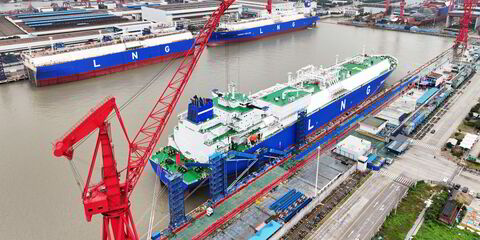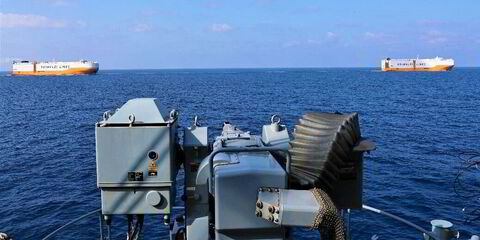The port of Bristol has been a significant success story in terms of trade and investment over the past 30 years but like many of its rivals, it is struggling with soaring energy costs and the need for a new zero-carbon strategy.
As the COP27 climate talks start this weekend in Egypt and with the International Maritime Organization under fierce pressure to up its targets and implement quicker change, I visited Bristol in south-west England to talk to the people who have been running the docks there since they bought it in 1991 for £36m on a 150-year lease.
‘Low profile’
The owners, managing director Sir David Ord and chairman Terence Mordaunt, like many in the maritime world, insist on maintaining a “low profile”, so the challenges of running this £89m turnover business post-Brexit, post-Covid and post the Russian invasion of Ukraine must be explained publicly by others.
The energy crisis has increased the cost of powering the port from 4.5p to 21p per kilowatt hour and the latter figure includes government support. An annual bill of £1.7m has this winter, therefore, turned into one of £8m.
John Chaplin, the port’s director of external affairs, said: “This is our biggest concern at the moment and it’s almost impossible to know what the future holds with some predicting the cost of power could go as high as 50p to 60p [per kilowatt hour].”
That would surely endanger the future of the docks: a charge so high it would be difficult to pass on to customers via port dues?
Chaplin said: “It would be difficult. We are doing everything we can, all the obvious things, like changing computer models for the pumping machines — in the enclosed docks — so they can work at night when power is cheaper.”
We are doing everything we can, all the obvious things ... so they can work at night when power is cheaper
— John Chaplin
The docks — made up of Avonmouth and Royal Portbury docks on 2,600 acres of land on both sides of the River Avon — has a huge mixture of cargoes: from cars to containers, agricultural produce to nuclear parts for the new Hinkley Point C power station, and from jet fuel to wood pulp.
The docks were in bad shape commercially prior to the takeover from the city council — not least due to an overrun in the cost of building a new container dock at Royal Portbury. This made the owner — then the local council — a willing seller and removed some of the potential for industrial action that hit other ports.
Former UK prime minister Margaret Thatcher’s decision to abolish the National Dock Labour Scheme opened the way to privatisation of ports around the country — a move bitterly opposed at the time by many parts of the trade union movement.
Since 1991, Bristol Port has seen £450m of private money invested in plant, equipment buildings and infrastructure, and says relations with staff are good. While a wave of industrial action has hit rival ports, such as Felixstowe and Liverpool, Bristol has been spared.
That may have to do with a “generous” 8% pay rise but Chaplin said the port — since privatisation — has benefited from a collaborative approach with the unions. Unlike some of its rivals, Bristol directly employs all those workers loading and discharging vessels looking after training, holiday pay and career structures.
The port did make use of a government furlough scheme during the pandemic but says it ended up paying back £308,000 of public money when it realised cargo throughput was fairly steady.
In fact, container traffic has rocketed upwards from less than 10,000 boxes in 2008 to more than 65,000 last year. Vehicle movements — this is a transit centre for Jaguar Land Rover, Renault and many others — reached over 700,000 in 2016 but have dipped to half this level now.
Riddle of the Sphinx
You won’t find the port blaming Brexit though. Chaplin argues the UK is better off without European Union regulations not least the habitat directive, which he claims could have closed the port if implemented badly.
Despite concerns about growing regulation on climate change and the fears that COP27 could eventually result in even tougher measures, the port is nevertheless working to decarbonise its operations.
Smaller diesel-powered cargo-handling equipment is being replaced with electric ones as are some of the more diminutive harbour vessels, while Bristol is looking at hydrogen as a fuel and was visited earlier this year by United European Car Carriers’ Auto Advance ship powered by an LNG hybrid propulsion system.
But net zero by 2050? It seems hard to imagine even in this modern and vibrant maritime hub. May be easier to solve the Riddle of the Sphinx.(Copyright)





